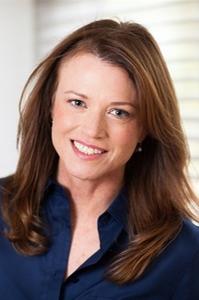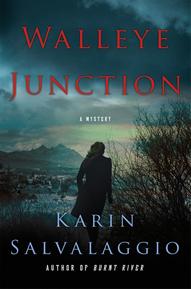
|
|
| photo: Matt Smith | |
Karin Salvalaggio was born in West Virginia in the 1960s. She attended the University of California/Santa Cruz, graduating in 1989, but aside from two years in Italy, she has lived in London, England, since 1994. She has an MA in Creative Writing from Birkbeck, University of London. Her latest novel, Walleye Junction (St. Martin's Minotaur), is the third installment in the Macy Greeley Mystery Series.
On your nightstand now:
I have slightly eclectic and, dare I say, erratic reading habits. I also have an annoying tendency to dip into books as time and inspiration allow, which is probably why I love short stories. I'm ashamed to say that I'm only just now reading Light Years by James Salter. The prose is exquisite. The Bluest Eye by Toni Morrison is equally mesmerizing. A collection of short stories and essays by Shirley Jackson called Let Me Tell You is also on my nightstand, along with Jo Nesbø's Headhunters and the story collection Too Much Happiness by Alice Munro.
Favorite book when you were a child:
I'm sure there were other books I treasured, but Jellybeans for Breakfast by Miriam Young is the book I remember most fondly. It was probably one of the first books I read repeatedly, a habit that would continue over the years whenever I found something I loved. It is an imaginative story about friendship, adventure and, best of all, jellybeans. Sadly, I no longer have a copy and an online price of more than $300 puts another one well out of reach.
Your top five authors:
Cormac McCarthy, Shirley Jackson, Joyce Carol Oates, Daphne du Maurier and Henry James.
Book you've faked reading:
It's painful to admit this publicly but I gave up on The Goldfinch by Donna Tartt about two-thirds of the way through. I loved The Secret History and found inspiration for my own writing in Tartt's portrayal of small-town America in The Little Friend, but I couldn't get through her latest novel. Sadly, I'll probably have to wait another 10 years before I get to a chance read the next one. Book you're an evangelist for:
Book you're an evangelist for:
I highly recommend We Have Always Lived in the Castle by Shirley Jackson. It is a remarkable novella. Jackson died before its publication at just 48, which was a great loss to modern literature, for despite her ongoing battles with alcoholism, inner demons and obesity, she was clearly at the top of her game. We Have Always Lived in the Castle is a haunting work of enduring genius that deserves close study. The 18-year-old protagonist, Mary Katherine Blackwood, or Merricat as she is better known, is not only one of the most precocious voices in Western literature; she also just might be the most unreliable first-person narrator of all time.
Book you've bought for the cover:
Ten Stories About Smoking by Stuart Evers. Picador's packaging is phenomenal. The collection is sealed in an oversized vintage cigarette pack. Thankfully, the short stories live up to the high expectations set out in the presentation.
Book you hid from your parents:
I may have been a precocious reader at the age of 11, but I really wasn't old enough to read The Exorcist by William Peter Blatty. At first I didn't understand my parents' reticence. The opening pages seemed so innocent.
Book that changed your life:
I was in high school when I first read The Outsiders by S.E. Hinton. The author was only 15 years old when she wrote it, so she understood what it was like to be a teenager growing up in America. Set in an Oklahoma high school, the coming-of-age story follows the relationship between two young men as they negotiate a confusing world of gang violence, underage drinking and family dysfunction. The characters, setting and storyline were all immediately recognizable to me. In a single stroke S.E. Hinton democratized fiction. Not only could I, as a teenager, consider writing a book, but I also was free to depict the world from my point of view. All that really mattered was the story.
Favorite line from a book:
"Between the wish and the thing the world lies waiting." --All the Pretty Horses by Cormac McCarthy
Five books you'll never part with:
All the Pretty Horses by Cormac McCarthy is an epic coming-of-age story about a young man named John Grady who, in 1950, is evicted from the family ranch. Accompanied by his friend Lacey Rawlins, he sets out across the border to Mexico on horseback. Descriptions blend with dialogue and exposition giving the work an expansiveness that pushes out the boundaries of the written word.
The poignant short story "The Ballad of the Sad Café" lends its name to a collection of stories by Carson McCullers. Passages not only describe the town physically but also set the tone for the loneliness and isolation, which plays a central role throughout the narrative. McCullers's opening paragraph describes the oppressive heat of an Oklahoma afternoon in August and the decay of a building that once housed the café that represented the heart of the community.
Merricat Blackwood is the unreliable narrator in Shirley Jackson's brilliant novella We Have Always Lived in the Castle. Merricat is a young woman living in an elaborate dream world. She believes she's a witch and uses magical spells to ward off what she considers to be threats from the outside world. Addressing the reader in the intimate, Merricat never once apologizes for poisoning her entire family with sugar-laced arsenic six years earlier.
I'd want to take the complete works of Henry James to my desert island, but if pressed to make a choice, I'd pack Wings of a Dove. This exquisite Edwardian tale of love, betrayal and loss is set in London and Venice, two of my favorite cities. When star-crossed lovers Kate and Merton scheme against an ailing American heiress named Milly, they're unprepared for the emotional reckoning that follows.
"Don't Look Now" will be familiar to many readers because of the 1973 film of the same name. Written by Daphne du Maurier, it is part of a larger collection of short stories entitled Not After Midnight. Set in the confusing labyrinth of canals and dark alleyways that crisscross Venice, "Don't Look Now" is inhabited with compelling characters and a narrative structure that leaves the reader begging for release.
Book you most want to read again for the first time:
All the Pretty Horses by Cormac McCarthy really inspired my writing. The prose is extraordinary and it is clear from the beginning that McCarthy has an accurate ear for naturalistic dialogue, but it is the landscapes described in McCarthy's novels that I'm most attracted to.
Your favorite short story:
"Where Are You Going, Where Have You Been?" is a short story by Joyce Carol Oates. Though it is only a little over 5,000 words in length, it has more complexity than most novels. It is a tale that can be read as a crime story, an allegory, a snapshot of a shifting culture, a moral parable and a statement on feminism. By setting it in the mid-1960s, it perfectly encapsulates a time when the worship of God was quickly giving way to the worship of popular culture. It is based on the real-life serial killer Charles Schmid, who was nicknamed "The Pied Piper of Tucson" after he murdered three women there in 1964. Oates's story is a fictionalised account of a teenage girl's abduction played out against the backdrop of postwar America's transition into a more turbulent cultural and social age.

